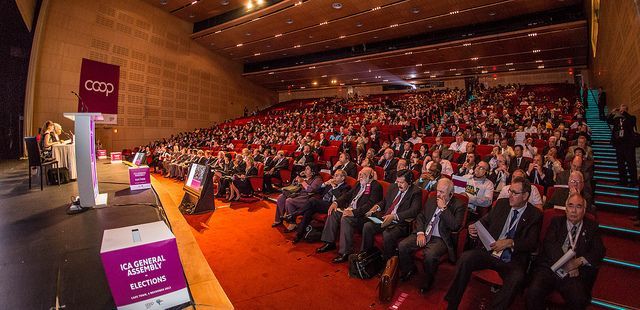
The International Co-operative Alliance has gone through a period of radical change over the past four years, according to its President Dame Pauline Green.
At the Alliance's General Assembly, Dame Pauline presented a report on the last term of office for herself and the board, which was fully elected at the Cape Town event.
Dame Pauline said: "When the International Co-operative Alliance board was elected in 2009 it set out a programme of radical change. A change into a valuable voice for the global movement."
She said the Alliance "influences global institutions and media" and that during the period the board was given impetus and focus by the United Nations naming 2012 as the International Year of Co-operatives.
The Alliance "maximised the value of the Year", according to Dame Pauline and the organisation has also gone through a period of internal change.
Dame Pauline said members of the Alliance approved a greater decentralisation to the regions and a larger distribution of membership fees. "In 2007, the global office kept 83 per cent of subscription funds paid by members and distributed 17 per cent to regional offices," said Dame Pauline. "There was no funding to sectors, this had to change. By 2011 the business sectors, which are much valued, received ten per cent of the global subscription funding.
"It's not enough but a start. The distributions for the regions, has increased from 17 per cent to 45 cent. The global office has decreased from 83 per cent to 45 per cent. I'm pleased that despite the cut we have reduced costs, we have brought the staff budget down from 80 per cent to under 50 per cent and we have made surpluses and diversified our income streams."
In his Director-General's report, Charles Gould told the Assembly that the Alliance has been laying the foundations for the Co-operative Decade this year. He said: "Much of the work on the Blueprint this year has been foundational. We have been designing the marque, establishing the Blue Ribbon Commission and understanding the data of co-op sustainability.
"Alongside that work, we engaged Sommersons to help us be clear on what our external messages are on the Blueprint. We want to be very clear how we communicate that externally. We do have a core message in the Blueprint, co-operatives are a growing and sustainable form of business, which is a message of hope and promise that is very much needed and welcomed at this particular point in history."
The Alliance has completed the work that is involved in relocating the organisation to Brussels from Geneva. The Alliance is now registered as an international non-profit association under Belgian law; and as of 31 December the Geneva operation is being dissolved. Mr Gould added that it's the Alliance's intention to share offices with other co-operative organisations in Brussels — it is already sharing a communications team with Euro Coop.
Dame Pauline also challenged the movement to be wary of "dark spots" within the movement. She said: "While co-op financial institutions have come out well from the financial crisis, some dark spots have been revealed."
Highlighted were "worrying trends" that have affect the sustainability and member participation of co-operatives in areas such as the Co-operative Bank in the UK, the co-op credit institutions in Cyprus and Rabobank in the Netherlands.
Dame Pauline added: "This meeting is so important. When a co-operative fails it is invariably a failure of governance, a failure of membership and a failure of empowerment. This is a massive opportunity to build new ways in participation and to make an impact for the young. This is how we can keep our movement alive, and invigorate our membership profiles.
"The next stage is to drive the Blueprint, drive our campaign to ensure our enterprises have community engagement and good business ethics."




